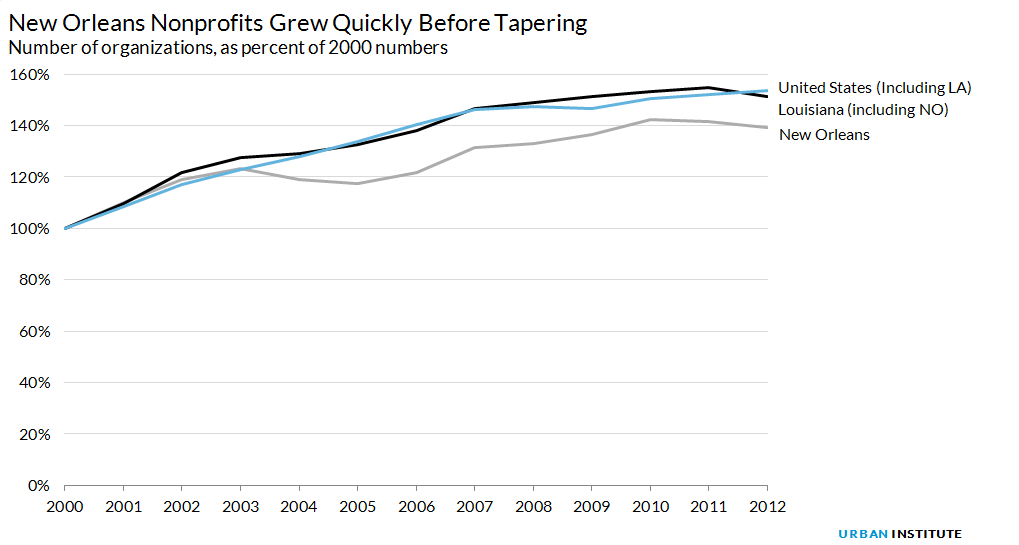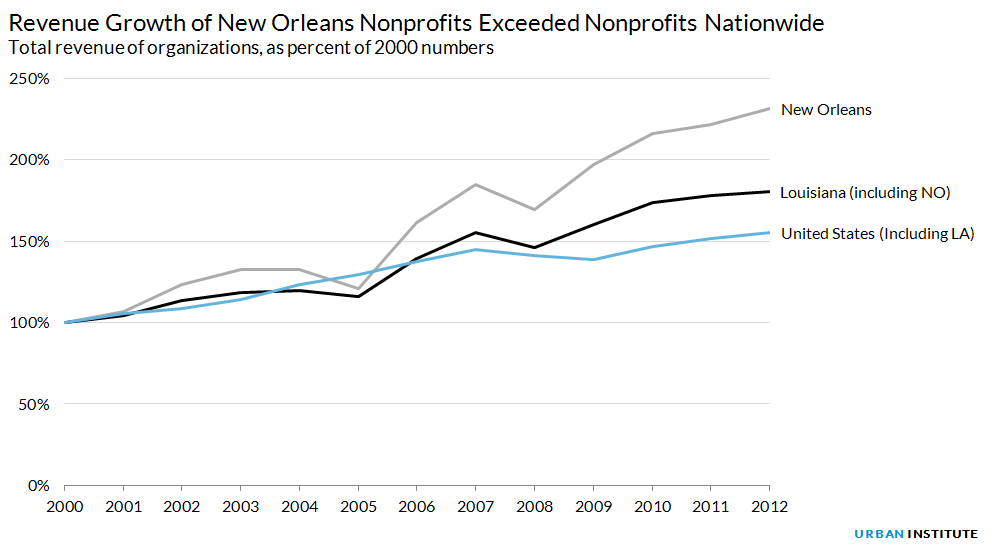
The widespread outpouring of support in the wake of Hurricane Katrina paved the way for a surge in the New Orleans nonprofit sector, as nonprofits rushed to the aid of a populace that needed help.
In a 2012 report, Urban Institute researchers found that health and human service nonprofits in the New Orleans area were relatively young: half had formed since 2000, and one in seven New Orleans nonprofits were started in direct response to Hurricane Katrina.
Now, 10 years after Hurricane Katrina, was this growth in the nonprofit sector a sign of real sustainable, lasting change? Or was it a relative flash in the pan, a surge indicative of massive support at the time of a humanitarian crisis, but fading as national attention drifted elsewhere?
According to data from the Urban Institute’s National Center for Charitable Statistics, the growth in the number of active nonprofit organizations with $50,000 in revenue filing in Louisiana actually eclipsed the comparative national growth from fiscal years 2007 through 2011.
And although the New Orleans nonprofit sector saw a slight decline in numbers in the early 2000s, the subsequent growth, beginning in 2006, was much steeper than the national numbers until 2010.

But in the last few fiscal years for which we have complete data, the rise in the number of organizations in the New Orleans area has tapered somewhat compared with the growth in nonprofits nationally.
Still, the number of nonprofits is not the only sign of growth: nonprofit organizations are often absorbed into larger organizations that seek the same goals, or end services once they have fulfilled their mission. For these reasons, it is often more telling to look at the financials for the nonprofit sector. Much of the influx in government spending, as well as private contributions from foundations or individuals, went directly to established organizations.

Using fiscal year 2000 as a starting point, it is immediately apparent that revenue growth rates for Louisiana nonprofits following Hurricane Katrina, and New Orleans nonprofits in particular, have far exceeded the growth rate of nonprofits nationwide. This growth flattened somewhat following the Great Recession, but the most recent numbers are climbing once again, showing increasing separation from national averages.
This continued growth in the nonprofit sector is critical for a metropolitan area that is still recovering and adapting.
After adjusting for inflation, total revenue for hospital and primary care facility nonprofits in New Orleans grew 8.3 percent between 2010 and 2012, compared with 4.3 percent growth for similar organizations nationwide during the same span; this continued development is vital for a city that had its health care system “shattered” by the hurricane.
The growth in nonprofit hospitals is second only to that seen by educational nonprofits. Educational organizations (excluding higher education) saw a total growth in revenue of 20.8 percent between 2010 and 2012 (adjusting for inflation), far outstripping the national growth for similar organizations (6.5 percent). This growth is unsurprising, considering that post-Katrina New Orleans moved to an all-charter school system.
But the needs of New Orleans residents are not restricted to health care and education. Although jobs in New Orleans have increased in recent years, a recent report from the Brookings Institution states that the number of “good” jobs—those offering upward mobility for low- or middle-skilled workers—is not rising as quickly.
Therefore, the continued growth in human services organizations in New Orleans is particularly welcome. Nationwide, human service organizations (which provide services relating to employment, housing and shelter, and disaster relief, among many other service areas) saw the smallest growth in numbers of any nonprofit type during the Great Recession.
But in Louisiana, human service organizations saw the third-largest growth in revenue from 2000 to 2012, behind education and health organizations. In New Orleans in particular, the total inflation-adjusted revenue for human service organizations rose 12.2 percent between 2010 and 2012, compared to a nearly flat 0.1 percent growth for human service organizations nationwide.
The growth in the New Orleans nonprofit sector, 10 years after Hurricane Katrina, has not been a mere flash in the pan. Instead, the data show that the sector continues to grow financially, reinforcing its place in the New Orleans economy.
Tune in and subscribe today.
The Urban Institute podcast, Evidence in Action, inspires changemakers to lead with evidence and act with equity. Cohosted by Urban President Sarah Rosen Wartell and Executive Vice President Kimberlyn Leary, every episode features in-depth discussions with experts and leaders on topics ranging from how to advance equity, to designing innovative solutions that achieve community impact, to what it means to practice evidence-based leadership.